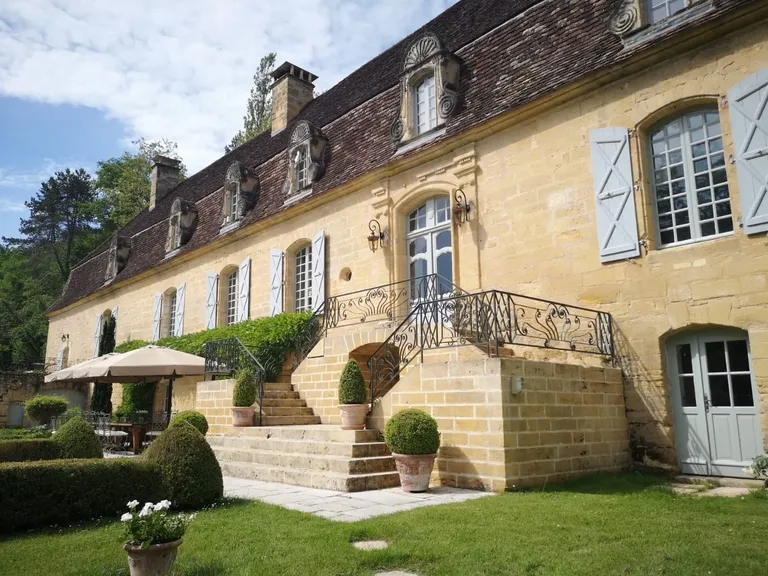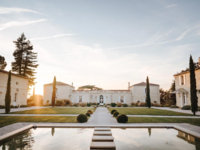A Guide to Planning the Most Romantic Wedding in France
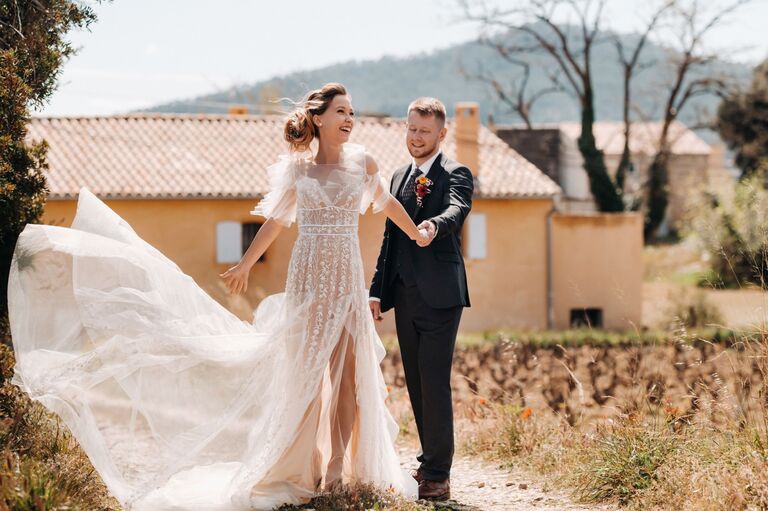
If you've ever visited France or spent hours scrolling through dreamy images of France's chateaus and vineyards on Pinterest (just us?), it's easy to see why many couples opt to have a romantic France wedding. The wedding destination is, in a word, magical, making it a truly memorable backdrop (hello, Eiffel Tower) for your big day. The paradise-perfect French Riviera topped our list of best destination weddings (of course, Paris was on there, too).
Planning your wedding in France, however, comes with some challenges. These hurdles are often true of a European destination soiree. There may be a different language or currency to deal with. Plus, the logistics of getting legally married outside your home country can be tricky to navigate.
To help with all of that, we speed-dialed Rachael Ellen of Rachael Ellen Events, a destination event planning and floral design company, and Eva Clark, founder and creative director of Eva Clark Events, to give us the scoop on what it's like to plan a destination wedding (or elopement) in France, including the best places to get married, legal requirements, budgeting tips and more.
France Wedding Planning in this Article:
- Why Couples and Guests Love France Weddings
- The Best Places to Get Married in France
- The Best France Destination Wedding Venues and Hotels
- France Wedding Legal Requirements
- France Wedding Planning Tips
Why Couples and Guests Love France Weddings
So, why France for a destination wedding? According to Ellen, the country's main draw is that it's a world-class destination.
"[Couples] are looking for an experience beyond the regular for their guests, and want to create unforgettable memories rather than just a fun party," she says, adding that France has beautiful wedding venues, amazing food and an undeniable feeling of romance in the air.
Pro tip: Invite a destination wedding travel expert to join your vendor team. Browse travel agents near you on The Knot Marketplace for France wedding expertise, group hotel blocks, flight arrangements and more.
The Best Places to Get Married in France
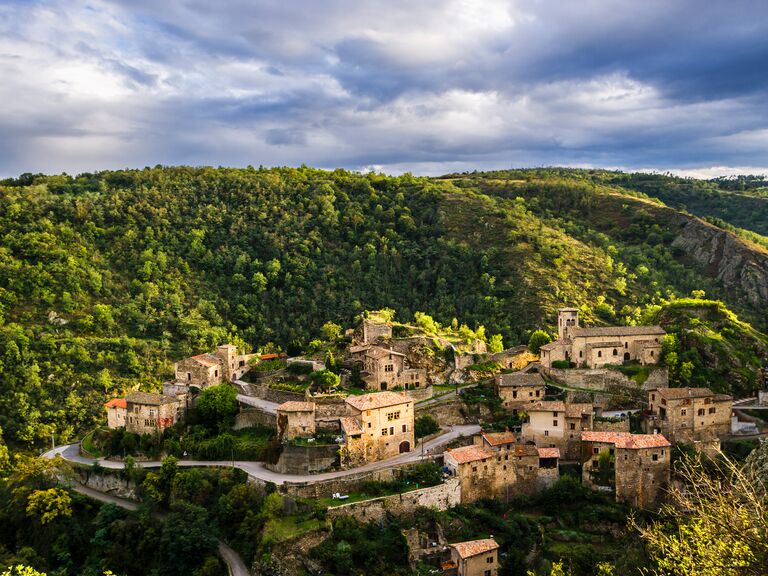
To say France has some of the best wedding venues in the world is an understatement. This can make it challenging to narrow down the perfect region for your dream wedding. Here, Ellen shares three great regions for a French wedding.
Loire Valley
One of the most popular areas in France to host a destination wedding is the Loire Valley. "It is home to many beautiful chateaus, has gorgeous mild weather and is just a drive or train from Paris," Ellen says.
Wine Regions
Ellen suggests wine-loving couples also consider famous wine regions in France, such as Champagne, Burgundy or Bordeaux, for a destination wedding. Burgundy in particular has some of the most beautiful castles in the world. Talk about the perfect venue for a fairytale wedding.
The South of France
For couples who aren't drawn to the French countryside vibe, Ellen points them to the South of France, namely the hilltop cities of Provence or the beachy resort towns near Cannes, Nice and Monaco. Each offers romantic and breathtaking French wedding venues and landscapes—think French chateaus and venues overlooking the Mediterranean Sea.
The Top Wedding Venues in France
France wedding venues are packed with European charm and details that play into the region's character — from fine wine to postcard-perfect views of Paris' main attractions. Some offer wedding packages and planners that streamline the process — a perk for couples planning from across the Atlantic Ocean
Shangri-La Paris
Set in the former home of a French royal and within walking distance of the Eiffel Tower, Shangri-La Paris is an opulent oasis for fairytale weddings in France. An in-house team of planners and culinary experts give pairs the white-glove treatment. Event spaces include a Grand Salon with old-world glamour including glittering chandeliers and an Eiffel Terrace. Packages include multi-course meals and printable menus. Some offer overnight stays for the to-be-weds. A spa and wellness services help couples and their guests look and feel their best ahead of the big day.
Château Forge du Roy, Dordogne
This 17th-century Forge nestled on 184 acres in Dordogne, Château Forge du Roy, only hosts one group at a time, offering a true feeling of intimacy and the staff's undivided attention. The 10 rooms fit up to 20 guests and are spread across two buildings, a Main House and a barn. However, the wedding venue in France can host up to 150 people underneath a spacious tent (a smaller reception room with refined decor seats up to 20). The charming setting in a wooded park feels straight out of a fairytale — couples can say "I do" on the edge of a pond.
Althoff Villa Belrose, Provence-Alpes-Côte d'Azur
Perched on a hill beside the Mediterranean Sea with views of the Golfe de Saint-Tropez, Althoff Villa Belrose has the breezy elegance that draws people to Provence. The heavenly hideaway is nestled between pine trees and well-manicured gardens, providing gorgeous photo opportunities. The attentive planning team will ensure planning is as easy as a sea breeze so couples can enjoy their guests (and eat, too). Some couples choose to stay there for the honeymoon, too. A spa offers beauty treatments like manicures and pedicures and relaxing bodywork like facials and massages that'll leave to-be-weds and their guests glowing from the inside out.
France Wedding Legal Requirements
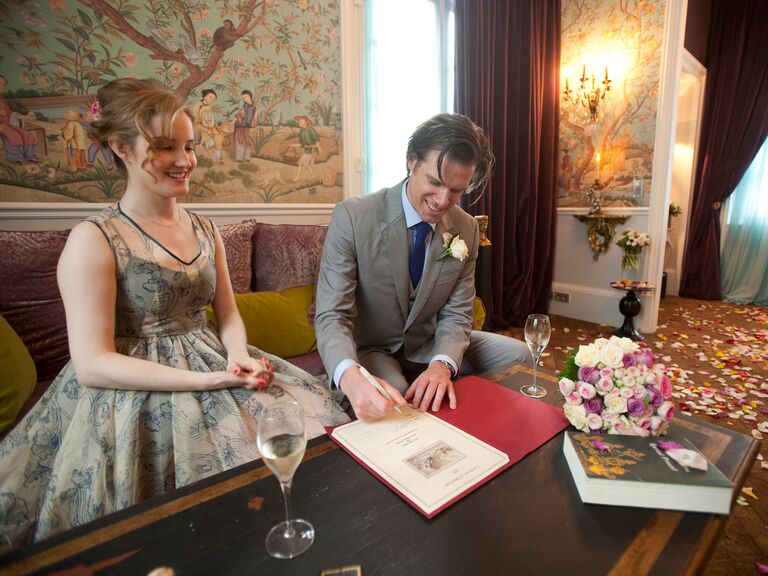
A destination wedding in France isn't all sipping Champagne in Champagne and photos with the Eiffel Tower in the backdrop. You'll want to ensure it's legally binding. To-be-weds hoping to get a marriage license in France will need to take some extra steps before walking down the aisle. Allow this guide to help.
Legal Weddings vs. Symbolic Weddings
When it comes to destination weddings in France, Ellen strongly advises couples to opt for a symbolic wedding versus a legal wedding due to France's incredibly complex foreign marriage laws. "We advise a civil ceremony in their home city before or after their French celebration, as getting legally married in France for non-French citizens is next to impossible," she says.
Required Legal Documents
If you do decide to go the legal marriage route in France, Clark notes that wedding ceremonies in France must be performed by a French civil authority, such as an officier de l'état civil.
"Recognition of marriages performed abroad are dependent upon the laws of the state where the marriage is to be recognized," says Clark. "Marriages performed in France are generally recognized by US states. Verifying with your own state, in advance, is highly recommended."
Legal Marriage Timeline
For couples having their legal wedding in the United States and their symbolic ceremony in France, Clark recommends checking with their county regarding requirements and paperwork needed—usually it's proof of identity (like a photo ID), birth certificates, proof of divorce if you've been previously married, and the fee for the marriage license. As for timeline, Clark says most civil ceremonies can be arranged in one to two weeks, though some may require appointments.
France's Legal Marriage Cost
By having a civil ceremony where you live, you only have to pay the fee for the marriage license and ceremony, which is typically affordable. Plus, you save on having to hire an officiant for your symbolic wedding day.
"Aside from dodging foreign legal processes, the benefit [of getting legally married in your home country] is that the person who officiates the ceremony in France can be anyone," Clark says. "They do not have to be ordained or recognized by the law of either country. This tends to make the ceremony feel far more personal, as it's a loved one officiating versus a stranger for hire."
Pro tip: Once you've decided on your wedding venue in France, send out destination wedding save-the-dates with important info so your guest can book the time off and start thinking about travel plans.
France Wedding Planning Tips

Now that we've covered the best places to get hitched in France and the legalities of everything, let's dive into planning your French destination wedding.
How to Get There
For the most efficient and cost-effective travel experience, Ellen advises flying into Paris, and then driving or taking a train to the region where you're hosting your destination wedding. For folks traveling from Europe, she says taking a high-speed train is a great option.
Once you and your guests are in France, transportation should be relatively easy. "France has a great network of trains and public transit for short-length travel, as well as a great train system for lengthier travel," Ellen says.
France Weather
When choosing an ideal wedding date for your destination wedding in France, weather is an important factor to keep in mind. France is known for experiencing each of the four seasons—"cold in the winter with potential for snow; rainy in the spring; hot in the summer; and mild to cold in the fall," Ellen says.
To make the best decision, Ellen recommends getting clear on what is most important for you in terms of weather and venue, and go from there. Also, she says, be mindful that many locals go on holiday in August, so finding vendors who are available that month may be tricky.
Choosing Your France Wedding Venue and Vendors
When planning a destination wedding, you want to work with experts and wedding planners who specialize in planning weddings in that country (bonus points if they've also planned weddings in the specific region or venue you want to host your destination wedding). The Knot Marketplace is a great resource for this.
As you're planning your destination wedding and choosing your venue and vendors, such as florists and wedding photographers, Ellen recommends focusing on creating an experience. "Find ways to turn the entire week or weekend into a thoughtful, experience-based event rather than just a standard party," she says. "With a destination, you typically have fewer guests so you can really put your budget toward the few guests that you do have."
France Wedding Cost and Budgeting Tips
Ultimately, the destination wedding cost isn't a black-and-white answer. However, Ellen believes destination weddings in France can often be nicer for less of an investment than a wedding in the US might cost. "Because the guest count is typically lower, our clients are able to spend more money per guest, so the experience is really incredible," she says. "Plus, there are certain elements, like flowers, that are naturally less expensive in France because they are shipped out of Holland rather than shipped across the ocean to the US."
However, as with all weddings—whether you're throwing a huge bash or a more intimate wedding—there are always unexpected costs that pop up. If you're looking to save some money, Ellen's top budgeting tip is to limit the guest count. "Never skimp on an experience to have more people attend," she says. "Make it magical for a smaller number of your closest friends and family."
Also, since you're planning a destination wedding in another country and exchange rates are subject to change, Ellen suggests making your wedding budget breakdown in euros instead of dollars.
Pro tip: Set up a free destination wedding website on The Knot with all the event details including your France wedding itinerary, things to do, guest travel information, RSVPs and more.
BethAnn Mayer contributed to this article.

